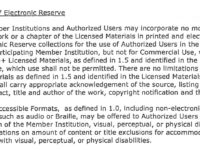My series on misleading on fair dealing concludes today with a post on Access Copyright’s demands for copyright reform. The copyright collective’s strategy is simply to force educational institutions to pay for its licence. It seeks to do so through two legal reforms: (i) restrict the use of fair dealing for education and (ii) massively increase the risk of liability through the imposition of statutory damages. The proposed reforms run directly counter to Canada’s longstanding commitment to balanced copyright, would reduce choice and innovation in licensing content online, and leave students and taxpayers facing risks of multi-million dollar liability that far exceeds the value of any copying.
This ten part series has addressed many of the misleading claims that have surfaced in recent months about fair dealing and copying practices in Canada:











